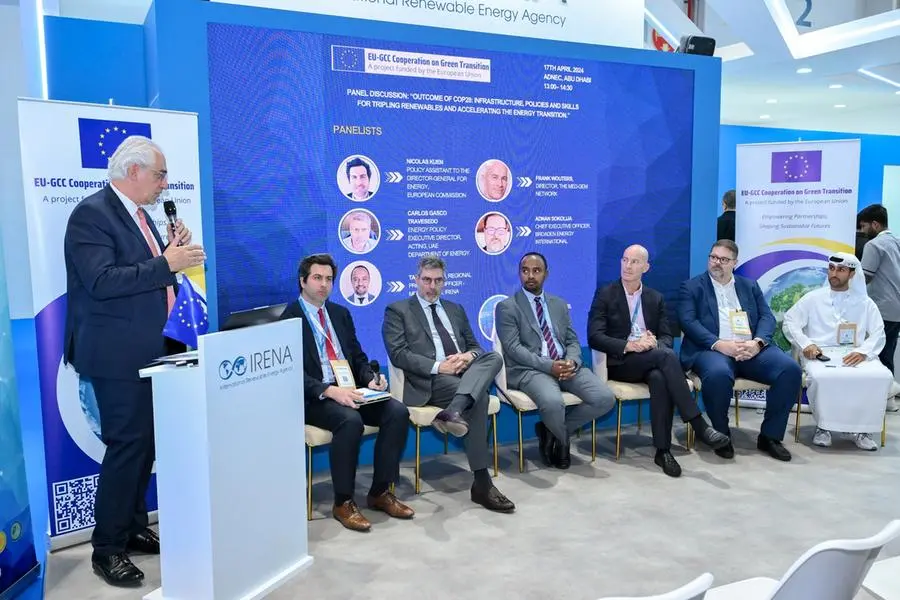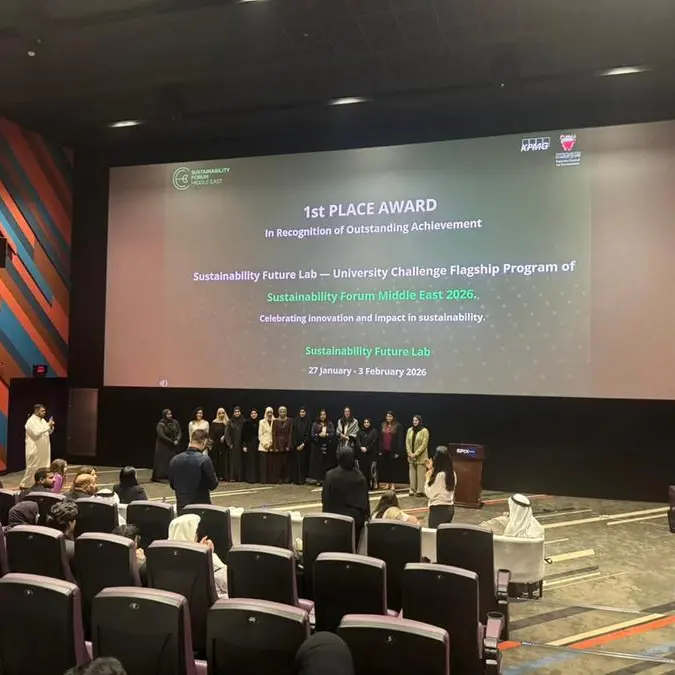PHOTO
In a significant step forward for clean energy and climate action, the European Union (EU) launched the EU-GCC Cooperation on Green Transition project. The event took place at the IRENA pavilion during the prestigious World Future Energy Summit (WFES) in Abu Dhabi.
The project aims to create a joint platform to exchange best practices and expertise between the EU and the GCC stakeholders, promoting and adopting policies and technologies that support the GCC’s green transition, and fostering a collaborative business environment between EU green tech companies and their counterparts in the Gulf region.
The launch of the project signifies a turning point in the global transition towards a clean energy future, marking a critical commitment to collaboration sets a powerful example for the international community, paving the way for a more sustainable and prosperous future for all.
Collaboration for a Sustainable Future
The launch event featured keynote addresses from distinguished speakers, including H.E. Lucie Berger, Ambassador of the European Union to the United Arab Emirates, Mr Lukasz Kolinski Head of Unit Renewables and Energy System Integration at the European Commission, and Tarig Ahmed, Regional Programme Officer - MENA Region at IRENA. The speakers underscored the significance of international collaboration in addressing global sustainability challenges and highlighted the transformative potential of the EU-GCC Cooperation on the Green Transition Project.
In her opening speech, H.E. Lucie Berger, Ambassador of the European Union to the United Arab Emirates, emphasised the project’s significance in the collective fight against climate change, highlighting the essential role of businesses from both the EU and the GCC countries in implementing the global targets of tripling renewable energy and doubling energy efficiency. Enhancing the business environment, through this project can play a pivotal role in reaching those targets.
Lukasz Kolinski, Head of Unit Renewables and Energy System Integration, European Commission said: “Collaboration between the EU and GCC on green transition is essential for achieving our climate goals. This initiative will drive innovation, create new opportunities, and contribute to a more sustainable future.”
Tarig Ahmed, the MENA Regional Programme Officer at IRENA, stated: “I strongly believe that the EU-GCC Cooperation on Green Transition Project is timely and acts as a pivotal initiative to enable renewable energy solutions and encourage regional collaboration. This project is an essential milestone towards achieving a sustainable future for the GCC region and ultimately to our planet.”
A Catalyst for Change
A key event highlight, echoing this year’s theme of the IRENA General Assembly, was the roundtable discussion titled “Outcome of COP28: Infrastructure, Policies and Skills for Tripling Renewables and Accelerating the Energy Transition.” The discussion focused on how the EU and GCC can work together to develop robust infrastructure for significantly increasing renewable energy in the region, implement effective clean energy policies and equip their workforce with the necessary skills for the evolving energy landscape.
Additionally, the discussion explored avenues for knowledge sharing, technology transfer, and joint project development, paving the way for a more sustainable future.
The EU-GCC Cooperation on Green Transition Project is poised to catalyse change. By fostering deeper collaboration, the project aims to increase the deployment of renewable energy sources significantly, stimulate environmental protection efforts, enhance economic growth and diversification, and strengthen resilience in the face of climate change impacts.
About the EU-GCC Green Transition Cooperation Project:
Funded by the EU, this project aims to strengthen the political and technical relationship between the EU and the GCC countries. By deepening engagement and collaboration, the project focuses on key areas such as green transition, energy system decarbonisation, zero-emission industries, clean-tech solutions, climate change mitigation and adaptation, and environmental protection. Specific objectives include promoting and adopting policies and technologies that support the GCC’s green transition, informed by EU best practices, and fostering a conducive business environment for collaboration between EU green tech companies and their counterparts in the Gulf region. The project seeks to contribute to a more sustainable and mutually beneficial partnership.




















